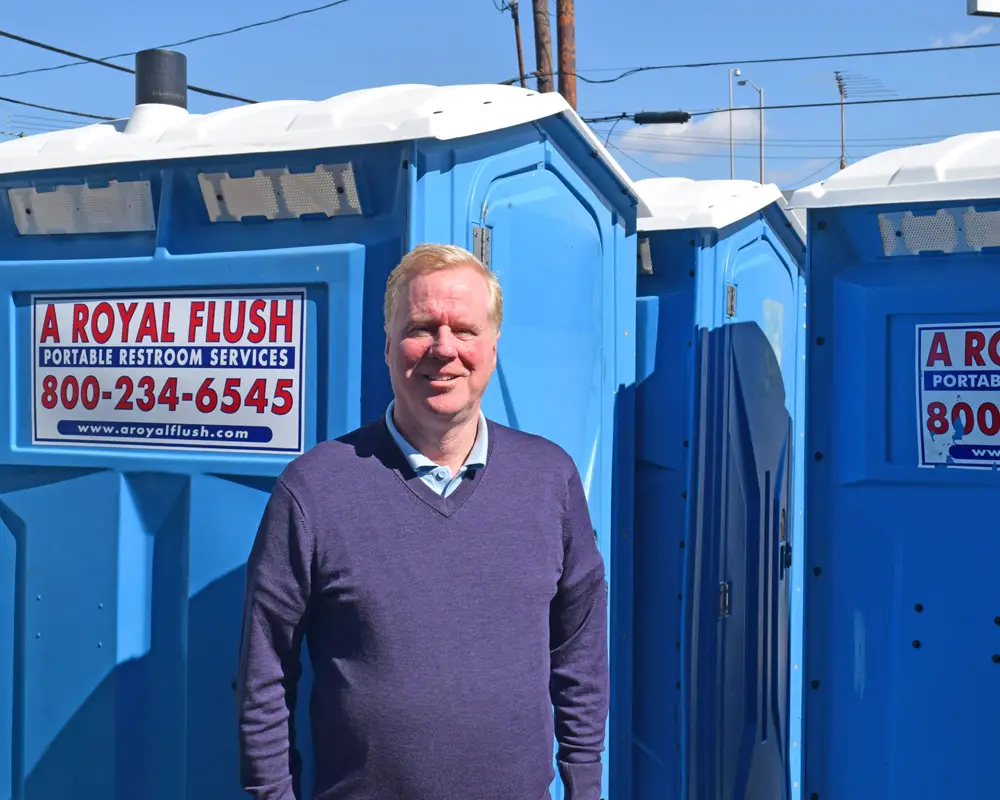A Royal Flush reigns in portable toilet industry

When nature calls and a bathroom is nowhere to be found, Timothy Butler is often there to help with the response. Or, to be more specific, the distinctive blue and green portable toilets from Butler”™s Bridgeport-based company A Royal Flush can often be found being in the right place at the right time.
Not surprisingly, Butler never envisioned himself as the chairman of a company that serves the portable toilet industry. “It was kind of a fluke,” said Butler, who was an attorney when he joined four friends as investors in A Royal Flush two decades ago as a 5 percent shareholder. “The majority shareholder and driving force, Bill Malone, passed away in 2017. Some of the other partners retired and, virtually overnight, I went from 5 percent shareholder to running the company.”
Upon gaining the leadership at A Royal Flush, Butler conducted a study to determine whether he should put it up for sale or channel new investment funds and grow the business.
The answer, it seemed, was obvious.
“The decision was made by all of the employees and their family members, who asked me not to sell,” he recalled. “It was a family business, and we”™re one big family ”” with over 140 families depending on this for their job. If I sold, I realized most of them would not keep their jobs.”
A Royal Flush has approximately 8,000 portable toilets spread across the Northeast from Philadelphia to Springfield, Massachusetts. The company divides its business focus into three key areas where bathroom facilities are often lacking: the construction industry; special events; and outdoor municipal properties including parks, marinas and ball fields.
Since taking the leadership role, Butler began upgrading the company”™s internal operations. Customer service was a key focus and Butler invested in new trucks “in order to provide better service to our daily route customers.”
New computer systems were installed along with upgrades to the telephone system and billing operations, and Butler strengthened his commitment to the company”™s drivers and workers with improved benefits, including a new bonus program to reward jobs well done.
Traditionally, the life span of A Royal Flush unit was roughly six years, with the unit going to different locations over its existence. “The first two years would be at high-end and special events,” Butler observed. “Then, it was moved down to a park toilet. Its final days would be spent at a construction site.”
While Butler stated his construction industry presence is not in doubt ”” “You name the company and we”™ve worked with them,” he said ”” he is making an effort to prioritize these clients with upgraded units.
“People want higher-end products at construction sites,” he said. “We are trying to make construction customers feel more appreciated.”
For years, A Royal Flush had a dominant role in the northeastern market. But Butler pointed out that “some very large national companies have moved into the market and are taking up market share.” As a result, the company is putting a greater emphasis on proactive marketing.
“For the first 15 years, we didn”™t have to do anything,” Butler said. “Everyone came to us because we were the big player. Now, we have a marketing department and we do a lot of ads and cold calling and mailing. We are also looking at doing radio and television and expanding print ads.”
Butler is also putting a greater push on the company”™s trailer rental business and on its installation of electric flush toilets in campers and trailers. And while A Royal Flush can still be seen at high-profile regional events including PGA tournaments and the Road Runners”™ marathons, Butler is aiming for a near-future where A Royal Flush”™s units become even more ubiquitous throughout the East Coast.
“I would like to expand the company,” he said. “We were originally in Washington, D.C., and I would like to expand back there. I want to go up to Boston and then to Portland, Maine, and down towards Charleston. I would like to own the I-95 corridor.”